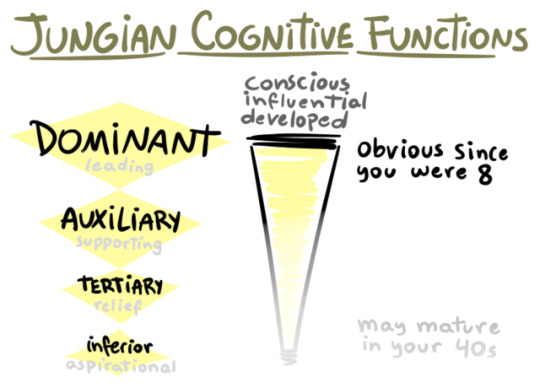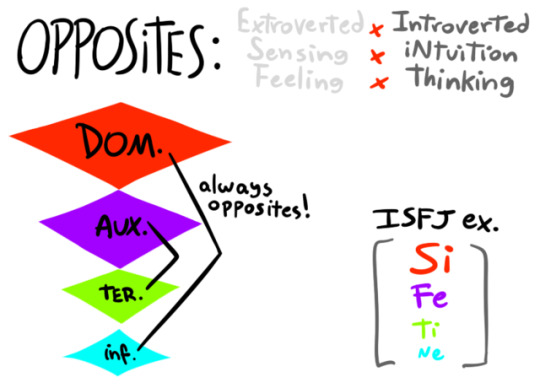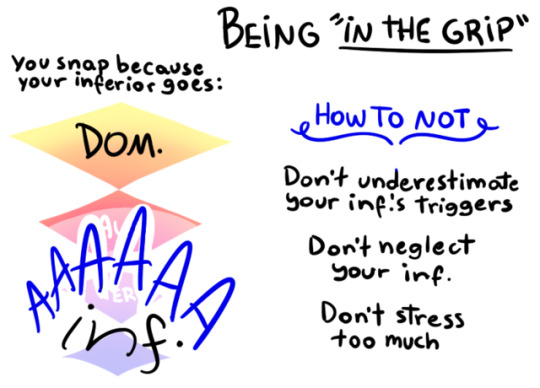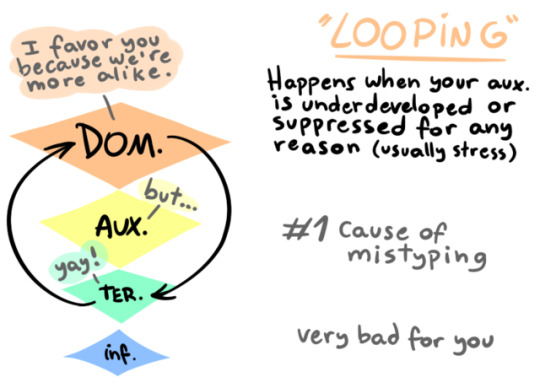A blog where an ENTP types characters from mostly anime and manga.
Don't wanna be here? Send us removal request.
Note
i hope you realize that typology such as enneagram, iv, and mbti are all false and illusionary concepts created by mankind right? there is no such thing as any of this shit cause it’s all just pseudoscience bullcrap lmao (it only makes sense cause it demonstrates some aspects of basic behavior)
i hope you realize that time itself is an illusionary concept created by mankind and your existence is a joke to the universe
121 notes
·
View notes
Note
can u roast ne-doms specifically enfps
doesn’t real life already punch you enough?
79 notes
·
View notes
Note
Glad you finally typed BNHA! I was actually waiting for this! However, I was wondering in which scenes Tsuyu wielded Ne & for Bakugou Ni!
Tsuyu can be hard to read. We see her Ne subtly throughout. Most notably in her ability to jump ahead in thought. Her thought process is not linear and she is often thinking of possibilities.

We saw this as a strategy when the school was bring attacked the first time, but we actually see her Ne the most when she is interacting with those who she really cares about. Although she doesn’t speak often she is invested in the future of those she is close with. She isn’t preoccupied with the now, but sees the potential in all of them. She helps them where she can on their path. But like most INxPs, it isn’t always obvious right away because Ne objectivity can counter dominant introverted perception which is personal and ever changing, especially introverted feeling.Unlike the dominant Ne type she isn’t quick to voice her observations, but instead is typically reserved and surprises others with their observations and problem solving. This is Asui to a T.
As to Bakugo, he is a long-term thinker overall; looking past his relationship with Midoriya, which can make him impulsive. He has had his life goal set out for himself from a very young age.

He has insured his power and academics have all gotten him to this point. He is incredibly ambitious and despite the rage to Midoriya, quite put together. His impulsiveness is a clear unhealthy use of tertiary Se which could lead him to be mistyped as an Se dominant. He uses his impulsiveness as backlash to his inferior function and to retain his world view of him being better than Midoriya. There is a certainty to how the world works (Te) and he is all about getting ahead within that (Ni). He is so busy comparing himself and looking at the outside world that he refuses to look inward (inferior Fi).
22 notes
·
View notes
Note
When trying to type both characters and real people, a frequent difficulty I come across is trying to distinguish their lower functions. I was generally lead to believe, that the tertiary is a function people like using, but are often worse at than they think, whereas the inferior combines both distaste and low ability, but I'm not sure, how true this is in practice. Do you have any advice on the best way to tell someone's tertiary apart from their inferior? Thank you in advance!
Inferior is both a blessing and a curse. It both is a goal for the type and their biggest obstacle. Simply put, it can be the opposite end of their dominant. For example the Ne dominant is big picture in their perception, but misses the concrete details. The missing the details is their Si inferior. Just as an Si dominant can get too into the details and miss the big picture and that is their inferior Ne.
The inferior function can be harnessed in a positive way, it just won’t be the type’s go-to. You can see this a lot with the Tenth Doctor (ENTP). He is picking up the details but his focus is on the patterns and big picture. Hence, why his character hits his own head a lot and says, of course, as soon as the puzzles starts to fit together for him. Although he takes in the small details he misses their importance till later.
Tertiary is both a complement and a shield to a personality. It is easiest to use myself as an example. My tertiary Fe makes me appear as more of a people person than I am. I am aware of the social obligations and social norms around me, but to care about them so much as a judging function is stressful to me. Hence, me and other ENTPs can start to use Fe as a shield to deflect this stress, usually in the form of humor. Hence you get ENTPs in fiction like Jerry Senifeld, Chandler Bing, Jim Halpert, Deadpool, Tony Stark, Dorothy, and Damon Salvatore who all use humor about other people in order to deflect off themselves.This makes situations easier for them in the short term and deflect how much they care about how they are received as well.
In a healthy form, Fe in an ENTP is why ENTPs need to discuss their ideas and ponderings aloud with others. They need to bounce these ideas off of others and see how they are received. However, the stark difference is that they do not take the opinions of others as crucial to their conclusion. They do not need others to agree or disagree. They use the agreement or disagreement to see how they, themselves feel about the idea. Sometimes an ENTP more often hears someone agree with them and realizes the idea is stupid. Or the annoying one which many of the characters I listed do, they hear someone disagree with them and this makes them for the idea more than ever. In this case Fe is still used to work and discuss with people, however it loses the same use that Fe doms and secondaries use it for, as the ENTP does not need agreement from the group or person. It is used to feel out the situation or idea.
This can compliment the ENTP’s dominant and secondary functions as it can give a connection of their ideas to people and to help others. Joujia from Pycho-Pass is a great example of this. As not all ENTPs are jokers.
If you want to tell the tertiary and inferior apart. Look at what they struggle with the most. What do they consistently seem to not consider in an argument or a project? For the ExTJ they often don’t consider themselves and their own feelings on a matter. They are more apt in a scenario to be utilitarian, we may lose one family but we save more people overall. For the IxFP, they often disregard what the standard is. This is not to say that they always ignore this, but it is the thing they consistently have issues with. The tertiary is how they then react when confronted with these issues. The IxFP responds with their tertiary inner perception (Ni or Si) finding specifics that back their perception in order to dismiss the outer-world. Exploring why they are so special and not in a box even more instead of dealing with the existence of an outer-world that exists outside of them whether they like it or not. This is an unhealthy response though and the tertiary may not show itself in that way if the person if functioning properly.
I feel Zuko and Luke Skywalker are great examples of how to spot healthy tertiary down the line, or at the least a stronger use of it. Both are ISFPs with tertiary Ni. This function questions perceptions of situations and synthesizes many ideas. It is a way of processing the abstract. Both characters learn by experience and have a hard time understanding situations through an abstract/philosophical lens. But through their experience they come to understand these grander ideas. Becoming wiser and giving advice. They are able to be abstract and philosophical but it isn’t their go to and it is something they must get to by using their dominant and secondary functions first.
Does this help?
24 notes
·
View notes
Note
Can istps do social work? Many friends have told me I am an istp. I can recognize myself in the functions Se and Ni. And I thiught I could recognize myself in Fe an Ti too. I can be very blunt and direct, but I like doing projects and figuring out how people think. And I love helping them when they are stuck. My hobbies include a lot of dancing and music. Doesn"t that make me an Isfp?
Your interests and your career do not determine your type. Your type is your thought process, your communication, and your approach. It does not determine interest and does not predestine anyone into anything. However, there are statistical trends that tend to happen with types as they discover where their thought process, communication style and approach seem to work best for them.
In short, those things don’t make you ISFP or any type. And an ISTP can be in any career including social work. People tend to look for MBTI to be like astrology or to give them more direction, but that isn’t what MBTI can provide, unfortunately.
Blunt, direct, projects, and how people think are indicators of type. I can tell you from this description you are definitely a thinker and your interest in projects is a possible indicator of Te.
20 notes
·
View notes
Text
Devilman: Crybaby MBTI
Fudo Akira ISFP

ISFPs are typically modest and may underestimate themselves. They usually do not like to be in the spotlight, preferring instead to take a supporting role, and will avoid planning and organizing whenever possible. Sensitive and responsive, they step in to do what needs to be done and are satisfied by their personal sense of being helpful to others.
Asuka Ryo ENTJ

ENTJs are natural leaders, and often take charge no matter where they are. They typically have a clear vision for the future, and intuitively understand how to move people and processes towards that goal. They tend to approach every situation with the attitude of an efficiency analyst, and are not shy about pointing out what could be done better. For the ENTJ, their ideas are a foregone conclusion: it’s just a matter of time before they can move the players to get everything accomplished.
Makimura Miki ESFP

Although they are characteristically fun-loving, ESFPs are also typically practical and down-to-earth. They are grounded in reality and are usually keenly aware of the facts and details in their environment, especially as they pertain to people. They are observant of others and their needs, and responsive in offering assistance. ESFPs enjoy helping other people, especially in practical, tangible ways.
Kuroda “Miko” Miki ISFJ

ISFJs are conventional and grounded, and enjoy contributing to established structures of society. They are steady and committed workers with a deep sense of responsibility to others. They focus on fulfilling their duties, particularly when they are taking care of the needs of other people. They want others to know that they are reliable and can be trusted to do what is expected of them. They are conscientious and methodical, and persist until the job is done.
Descriptions taken from Truity.
18 notes
·
View notes
Text
She-Ra and the Princesses of Power MBTI
Adora ESFJ

While appearing outwardly confident and assertive, on the whole, ESFJs are no more inwardly sure of themselves than other types. Indeed, because their inner Judging function, Introverted Thinking (Ti), is inferior, ESFJs may feel they have relatively little inner control. Finding inner control elusive, they naturally turn their focus outwardly, hoping that achieving outer control will somehow bring them inner calm and security. Their primary means of achieving outer control is through Extraverted Feeling (Fe), which serves as their dominant function. By way of their Fe, ESFJs can befriend, persuade, and direct others. In so doing, ESFJs can reap the benefit of social support, as well as a sense of control and influence in the world of people.
Catra ESTP

ESTPs are generally open and adaptable to new experiences. Despite their status as Extraverts, they often prefer “doing” more than talking. While they may be chatty at times, neither Se nor Ti is a highly verbal function. Thus, ESTPs first instinct is to express themselves via action rather than words. Their relationships are generally built around a breadth of shared activities (Se) rather than extensive, in-depth conversations. But since status and reputation are important to both their Se and Fe, ESTPs may be far more talkative at work or in public settings. In the public arena, they may quickly shift into “schmoozing mode.” This can differ dramatically from their private persona, where they can seem more independent and aloof. The ostensible disparity between their public and private personas may at times lead their intimates to consider them narcissistic or hypocritical.
Glimmer ESFP

ESFPs’ penchant for sensory and material novelties, as well as their knack for social “performance,” has at times earned them the label of “hedonist” or “life of the party.” While this may be true in some cases, especially early in their development, it only captures one aspect of the ESFP, namely, that of their dominant function (Se). What is often missed is the fact that many ESFPs present as intelligent, articulate, and composed. They use their tertiary function, Extraverted Thinking (Te), to express themselves in a measured and rational way.
ESFPs are generally adaptable and open to new experiences. Despite their status as Extraverts, they, like other SP types, are often more interested in “doing” or being otherwise entertained than they are in sitting around talking. While they can certainly be chatty at times, Se, by nature, is not a highly verbal function. ESFPs often express themselves through action rather than words, showing their love and thoughtfulness through gifts or acts of kindness.
Bow ENFJ

The ENFJ is warm, engaging, charismatic, persuasive, and talkative. These personality traits contribute to their status as kings and queens of the social realm. ENFJs can quickly read and establish rapport with others. Because of their love for people and formidable social intelligence, ENFJs develop extensive networks of friends, acquaintances, and social connections; they are networkers par excellence. Just as ESPs seek a breadth of sensory experiences (Se), so it is with ENFJs’ relationships and interactions with people (Fe).
Entrapta INTP

Since INTPs extravert Intuition (Ne) and Feeling (Fe), they can have a certain charm, approachability, and congeniality about them. When discussing a topic that interests them, they can be stimulating conversationalists, as their ever active minds can easily connect one topic to another, paving the way for a multifaceted and broad-ranging dialogue. If disinterested however, such as when forced to endure protracted small talk, they will quickly zone out or find a way of redirecting the conversation. Despite appearing outwardly genuine and personable, INTPs are more interested in discussing ideas than the commonplace details of people’s lives. They enjoy discovering what makes people tick—their motivations, interests, patterns, and propensities. This allows INTPs to further hone and refine their theories (Ti-Ne) of human nature (Fe).
Taken from Personality Junkie.
60 notes
·
View notes
Text
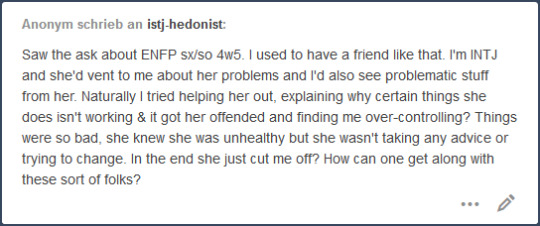



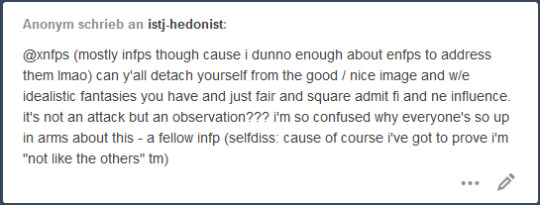





I wanted to let the topic rest for a bit but you guys kept sending me anons about this so…
Yes, of course you will also have xNFPs who are loyal til the day they die. Yes, other types can be cheating fuckers too. Yes, Enneatype, instincts and other factors like upbringing and random circumstances will influence behaviour as well. Some people will tolerate cheating if they are cheaters themselves ( those that have different conceptions on how open relationships should be). Others are hypocrites and won’t tolerate it when their partner does it but still feel entitled to do so themselves.
I said before that Ne wants to be entertained and therefore makes it more likely that strong Ne-users are quickly bored by relationships. The process behind it is not that Ne constantly wants to have new people around it. It’s more like that Ne is like a black hole that feeds on any kind of information and intellectual challenge it can get. And when there is nothing else to “eat”, no puzzle, no hobbies, no challenges at work, no other kind of drama and distraction, it has a tendency to fuck things up just “because”. Because self-destructive entertainment is better than none. Ne is more comfortable with drama than with peace.
That’s why ENTPs have a reputation for being troublemakers, for constantly starting arguments for no reason and why ESFJs get the stereotype of being drama-queens (Ne+Fe). Ne+Fe wants to provoke emotional reactions in others.
Ne+Fi wants to provoke emotional reactions in their own value system. They want to understand how they feel when they are crossing personal barriers. That other people get hurt in the process is mostly just a byproduct but rarely the intention. Actually many cheating xNFPs are subconsciously trying to hurt themselves first and foremost, trying to prove how messed up they are; that they are not worthy of a stable relationship. Projected self-harm, often a sign of low self-confidence.
But those are just patterns, correlations. Everyone who understands something about correlations knows that you have to take them with caution, they are generalizations and rarely a case of “100% of ENFPs do…, 0% of ISTJs do…” but usually more like “70% of ENFP and 20% of ISTJ”. And cause and effect are not always as they seem. But there is still truth to be found within those patterns.
49 notes
·
View notes
Text
Daily Lives of High School Boys MBTI
Hidenori Tabata ENFP

Most ENFPs have great people skills. They are genuinely warm and interested in people, and place great importance on their inter-personal relationships. ENFPs almost always have a strong need to be liked. Sometimes, especially at a younger age, an ENFP will tend to be "gushy" and insincere, and generally "overdo" in an effort to win acceptance. However, once an ENFP has learned to balance their need to be true to themselves with their need for acceptance, they excel at bringing out the best in others, and are typically well-liked. They have an exceptional ability to intuitively understand a person after a very short period of time, and use their intuition and flexibility to relate to others on their own level.
Yoshitake Tanaka ISFP

ISFPs are action-oriented individuals. They are "doers", and are usually uncomfortable with theorizing concepts and ideas, unless they see a practical application. They learn best in a "hands-on" environment, and consequently may become easily bored with the traditional teaching methods, which emphasize abstract thinking. They do not like impersonal analysis, and are uncomfortable with the idea of making decisions based strictly on logic. Their strong value systems demand that decisions are evaluated against their subjective beliefs, rather than against some objective rules or laws.
ISFPs are extremely perceptive and aware of others. They constantly gather specific information about people, and seek to discover what it means. They are usually penetratingly accurate in their perceptions of others.
Tadakuni ISTJ

ISTJs are quiet and reserved individuals who are interested in security and peaceful living. They have a strongly-felt internal sense of duty, which lends them a serious air and the motivation to follow through on tasks. Organized and methodical in their approach, they can generally succeed at any task which they undertake.
ISTJs are very loyal, faithful, and dependable. They place great importance on honesty and integrity. They are "good citizens" who can be depended on to do the right thing for their families and communities. While they generally take things very seriously, they also usually have an offbeat sense of humor and can be a lot of fun - especially at family or work-related gatherings.
Descriptions taken from Personality Page.
#daily lives of high school boys#danshi koukousei no nichijou#mbti#anime mbti#istj#enfp#isfp#tadakuni#Hidenori Tabata#Yoshitake Tanaka
41 notes
·
View notes
Text
Lucky Star MBTI
Izumi Konata ENTP

ENTPs are inspired innovators, motivated to find new solutions to intellectually challenging problems. They are curious and clever, and seek to comprehend the people, systems, and principles that surround them. Open-minded and unconventional, Visionaries want to analyze, understand, and influence other people.
ENTPs enjoy playing with ideas and especially like to banter with others. They use their quick wit and command of language to keep the upper hand with other people, often cheerfully poking fun at their habits and eccentricities. While the ENTP enjoys challenging others, in the end they are usually happy to live and let live. They are rarely judgmental, but they may have little patience for people who can't keep up.
Hiiragi Kagami ESTJ

ESTJs are conventional, factual, and grounded in reality. For the ESTJ, the proof is in the past: what has worked and what has been done before. They value evidence over conjecture, and trust their personal experience. ESTJs look for rules to follow and standards to meet, and often take a leadership role in helping other people meet expectations as well. They concern themselves with maintaining the social order and keeping others in line.
ESTJs often take on a project manager role at home as well as at work, and excel at setting goals, making decisions, and organizing resources to accomplish a task. The ESTJ wants to achieve efficient productivity and typically believes this is best accomplished when people and systems are well organized.
Hiiragi Tsukasa ISFP

ISFPs have a strong affinity for aesthetics and beauty. They're likely to be animal lovers, and to have a true appreciation for the beauties of nature. They're original and independent, and need to have personal space. They value people who take the time to understand the ISFP, and who support the ISFP in pursuing their goals in their own, unique way. People who don't know them well may see their unique way of life as a sign of carefree light-heartedness, but the ISFP actually takes life very seriously, constantly gathering specific information and shifting it through their value systems, in search for clarification and underlying meaning.
Takara Miyuki ISFJ

ISFJs are characteristically humble and unassuming, and rarely call attention to themselves. They can often be found offering assistance to others in a modest, understated way. They are loyal and hardworking, and often commit themselves to tasks and projects with the aim of being helpful to their families, friends, and communities. They are typically involved in social groups, but do not want the spotlight: they are more likely to be found behind the scenes, working diligently to fulfill their role.
Descriptions taken from Truity.
#lucky star#lucky star mbti#entp#estj#isfj#Tsukasa hiiragi#Kagami hiiragi#Miyuki Takara#konata izumi#mbti#isfp
6 notes
·
View notes
Text
When I Joined MBTIblr: The Types As Literally Everything, Sensors SUCK, MBTI AESTHETICS, Wild to Mild Misinformation, INFJs are the purest and best and only valid MBTI types, and so much more!
MBTIblr Now: MBTI is Dead and Ennea 8s killed it. Sensors have their issues, but the stereotype of dumb sensors come from elitist iNtuitives who can barely exist in this world as a human person. Correct information? I think? We’ve ascended beyond broad MBTI theory and are discussing niches of specific theories stemming from psychoanalysts you’d only know if you’ve done your homework. INFJs are the unhealthiest, worst, and least valid MBTI Type.
2K notes
·
View notes
Text
Kino No Tabi MBTI
Kino INTP

INTPs live in the world of theoretical possibilities. They see everything in terms of how it could be improved, or what it could be turned into. They live primarily inside their own minds, having the ability to analyze difficult problems, identify patterns, and come up with logical explanations. They seek clarity in everything, and are therefore driven to build knowledge. They are the "absent-minded professors", who highly value intelligence and the ability to apply logic to theories to find solutions. They typically are so strongly driven to turn problems into logical explanations, that they live much of their lives within their own heads, and may not place as much importance or value on the external world. Their natural drive to turn theories into concrete understanding may turn into a feeling of personal responsibility to solve theoretical problems, and help society move towards a higher understanding.
INTPs value knowledge above all else. Their minds are constantly working to generate new theories, or to prove or disprove existing theories. They approach problems and theories with enthusiasm and skepticism, ignoring existing rules and opinions and defining their own approach to the resolution. They seek patterns and logical explanations for anything that interests them. They're usually extremely bright, and able to be objectively critical in their analysis. They love new ideas, and become very excited over abstractions and theories. They love to discuss these concepts with others. They may seem "dreamy" and distant to others, because they spend a lot of time inside their minds musing over theories. They hate to work on routine things - they would much prefer to build complex theoretical solutions, and leave the implementation of the system to others. They are intensely interested in theory, and will put forth tremendous amounts of time and energy into finding a solution to a problem with has piqued their interest.
INTPs do not like to lead or control people. They're very tolerant and flexible in most situations, unless one of their firmly held beliefs has been violated or challenged, in which case they may take a very rigid stance. The INTP is likely to be very shy when it comes to meeting new people. On the other hand, the INTP is very self-confident and gregarious around people they know well, or when discussing theories which they fully understand.
Description from Personality Page.
1 note
·
View note
Text
WOTAKU NI KOI WA MUZUKASHII MBTI
Momose Narumi ESFP

ESFP is definitely a spontaneous, optimistic individual. They love to have fun. If the ESFP has not developed their Thinking side by giving consideration to rational thought processing, they tend to become over-indulgent, and place more importance on immediate sensation and gratification than on their duties and obligations. They may also avoid looking at long-term consequences of their actions.
For the ESFP, the entire world is a stage. They love to be the center of attention and perform for people. They're constantly putting on a show for others to entertain them and make them happy. They enjoy stimulating other people's senses, and are extremely good at it. They would love nothing more than for life to be a continual party, in which they play the role of the fun-loving host.
Nifuji Hirotaka ISTJ

ISTJs are likely to be uncomfortable expressing affection and emotion to others. However, their strong sense of duty and the ability to see what needs to be done in any situation usually allows them to overcome their natural reservations, and they are usually quite supporting and caring individuals with the people that they love. Once the ISTJ realizes the emotional needs of those who are close to them, they put forth effort to meet those needs.
The ISTJ is extremely faithful and loyal. Traditional and family-minded, they will put forth great amounts of effort at making their homes and families running smoothly. They are responsible parents, taking their parenting roles seriously. They are usually good and generous providers to their families. They care deeply about those close to them, although they usually are not comfortable with expressing their love. The ISTJ is likely to express their affection through actions, rather than through words.
Koyanagi Hanako ESFJ

ESFJs are people persons - they love people. They are warmly interested in others. They use their Sensing and Judging characteristics to gather specific, detailed information about others, and turn this information into supportive judgments. They want to like people, and have a special skill at bringing out the best in others. They are extremely good at reading others, and understanding their point of view. The ESFJ's strong desire to be liked and for everything to be pleasant makes them highly supportive of others. People like to be around ESFJs, because the ESFJ has a special gift of invariably making people feel good about themselves.
The ESFJ takes their responsibilities very seriously, and is very dependable. They value security and stability, and have a strong focus on the details of life. They see before others do what needs to be done, and do whatever it takes to make sure that it gets done. They enjoy these types of tasks, and are extremely good at them.
Kabakura Tarou ESTJ

ESTJs are take-charge people. They have such a clear vision of the way that things should be, that they naturally step into leadership roles. They are self-confident and aggressive. They are extremely talented at devising systems and plans for action, and at being able to see what steps need to be taken to complete a specific task. They can sometimes be very demanding and critical, because they have such strongly held beliefs, and are likely to express themselves without reserve if they feel someone isn't meeting their standards. But at least their expressions can be taken at face-value, because the ESTJ is extremely straight-forward and honest.
The ESTJ is usually a model citizen, and pillar of the community. He or she takes their commitments seriously, and follows their own standards of "good citizenship" to the letter. ESTJ enjoys interacting with people, and likes to have fun. ESTJs can be very boisterous and fun at social events, especially activities which are focused on the family, community, or work.
Descriptions taken from Personality Page.
#wotaku ni koi wa muzukashii#hirotaka nifuji#narumi momose#Koyanagi Hanako#kabakura tarou#mbti#istj#esfj#esfp#estj
17 notes
·
View notes
Text
Mob Psycho 100 MBTI
Kageyama Shigeo ISFP

ISFPs can be difficult to recognize because of their tendency to express themselves through action rather than words. They may initially appear distant or aloof, but if you watch closely, you can observe their caring in the thoughtful things they do for others. They are carefully observant of the practical needs of other people, and often step in with quiet, unassuming assistance at just the moment it is needed. ISFPs prefer to take a supportive role and are rarely assertive or demanding of attention. They are typically tolerant and accepting of others.
ISFPs typically have finely tuned artistic sensibilities. They are sensitive to color, texture, and tone, and often have an innate sense of what will be aesthetically pleasing. They are often naturals when it comes to arranging something artistically, and enjoy the process of taking in the sensations around them. ISFPs focus mostly on the experiences of the present moment, and are rarely ambitious, preferring instead to enjoy the simple pleasures of life: friends, family, and sensory delights such as food, music, and art.
Kageyama Ritsu INTJ

INTJs are perceptive about systems and strategy, and often understand the world as a chess board to be navigated. They want to understand how systems work, and how events proceed: the INTJ often has a unique ability to foresee logical outcomes. They enjoy applying themselves to a project or idea in depth, and putting in concentrated effort to achieve their goals.
INTJs have a hunger for knowledge and strive to constantly increase their competence; they are often perfectionists with extremely high standards of performance for themselves and others. They tend to have a keen interest in self-improvement and are lifelong learners, always looking to add to their base of information and awareness.
Arataka Reigen ENFP

ENFPs love to talk about people: not just the facts, but what motivates them, what inspires them, and what they envision achieving in life. They’ll often share their own aspirations freely, and want to hear others’ in return. The ENFP is unlikely to judge anyone’s dream, and will discuss the most imaginative and outlandish of fantasies with warm, enthusiastic intensity. They love to explore creative possibilities, and nothing deflates them faster than talking about dry facts or harsh reality.
ENFPs often seem unconventional, and may come off as scattered; they don’t tend to be in touch with their physical surroundings. They often overlook the details, as they are more likely to focus on connecting with other people or on exploring their own imagination and self-expression. They have little patience for the mundane and want to experience life with intensity and flair. ENFPs often have an artistic streak, and may be artistic in appearance. Many have developed a distinctive and quirky personal style.
Hanazawa Teruki ESFJ

ESFJs are conscientious helpers, sensitive to the needs of others and energetically dedicated to their responsibilities. They are highly attuned to their emotional environment and attentive to both the feelings of others and the perception others have of them. ESFJs like a sense of harmony and cooperation around them, and are eager to please and provide.
ESFJs value loyalty and tradition, and usually make their family and friends their top priority. They are generous with their time, effort, and emotions. They often take on the concerns of others as if they were their own, and will attempt to put their significant organizational talents to use to bring order to other people's lives.
Descriptions taken from Truity.
#mob psycho 100#mp100 mbti#shigeo kageyama#rites kageyama#teruki hanazawa#reigen arataka#esfj#isfp#intj#enfp#mbti
1 note
·
View note
Text
Boku No Hero Academia MBTI PART 2
Uraraka Ochako ISFP

ISFPs tend to be tolerant and nonjudgmental, but are deeply loyal to the people and causes that matter to them. They endeavor to accept and support other people, but are ultimately guided by their own core values. They will typically look for ways to be accommodating and may have difficulty dealing with others who are not willing to do the same.
ISFPs are typically modest and may underestimate themselves. They usually do not like to be in the spotlight, preferring instead to take a supporting role, and will avoid planning and organizing whenever possible. Sensitive and responsive, they step in to do what needs to be done and are satisfied by their personal sense of being helpful to others.
Yaoyorozu Momo ISFJ

ISFJs are characteristically humble and unassuming, and rarely call attention to themselves. They can often be found offering assistance to others in a modest, understated way. They are loyal and hardworking, and often commit themselves to tasks and projects with the aim of being helpful to their families, friends, and communities. They are typically involved in social groups, but do not want the spotlight: they are more likely to be found behind the scenes, working diligently to fulfill their role.
ISFJs are oriented to relationships, but can be reserved with new people. They rarely disclose personal information quickly. They tend to be focused and aware of their surroundings, and relate details from their own personal experience. They often converse in terms of what has happened to them and what they have seen first-hand. They are compassionate listeners, and typically remember details about people. They often enjoy hearing the facts about others in the process of making a connection.
Asui Tsuyu ISTJ

ISTJs have a serious, conservative air about them. They want to know and follow the rules of the game, and typically seek out predictable surroundings where they understand their role. You may find the ISTJ doing something useful even in social situations (for instance, organizing coats and hats at a party) as they’re often more comfortable taking charge of a task than they are chatting up strangers. When given something to do, they are highly dependable, and follow it through to the end.
ISTJs are practical and no-nonsense, and rarely call attention to themselves. Their clothes and possessions tend to be chosen based on utility rather than fashion, and they have an affection for the classics. ISTJs typically speak in a straightforward manner and have a good head for details. They are usually more enthusiastic about sharing factual information than exploring abstract concepts or unproven ideas.
Mei Hatsume ENTP

ENTPs are inspired innovators, motivated to find new solutions to intellectually challenging problems. They are curious and clever, and seek to comprehend the people, systems, and principles that surround them. Open-minded and unconventional, Visionaries want to analyze, understand, and influence other people.
ENTPs enjoy playing with ideas and especially like to banter with others. They use their quick wit and command of language to keep the upper hand with other people, often cheerfully poking fun at their habits and eccentricities. While the ENTP enjoys challenging others, in the end they are usually happy to live and let live. They are rarely judgmental, but they may have little patience for people who can't keep up.
Desciptions taken from Truity.
Part One.
#boku no hero academia#bnha mbti#uraraka ochako#yaoyorozu momo#asui tsuyu#mei hatsume#isfp#isfj#istj#entp
33 notes
·
View notes
Text
Boku No Hero Academia MBTI PART 1
Midoriya Izuku
INFP

INFPs value authenticity and want to be original and individual in what they do. They are often concerned with a search for meaning and truth within themselves. Following tradition holds little appeal for the INFP; they prefer to do their own exploration of values and ideas, and decide for themselves what seems right. INFPs are often offbeat and unconventional, but they feel no desire to conform. The INFP would rather be true to themselves than try to fit in with the crowd.
INFPs are accepting and nonjudgmental in their treatment of others, believing that each person must follow their own path. They are flexible and accommodating, and can often see many points of view. It is important to the INFP to support other people; however, the INFP may react strongly if they feel their own values are being violated. They especially hate being steamrolled by people who insist there is one right way to do things. INFPs want an open, supportive exchange of ideas.
Bakugou Katsuki
ESTP

ESTPs are often natural athletes; they easily navigate their physical environment and are typically highly coordinated. They like to use this physical aptitude in the pursuit of excitement and adventure, and they often enjoy putting their skills to the test in risky or even dangerous activities.
The ESTP's focus is action in the moment. They are engaged with their environments and solve practical problems quickly. ESTPs are excellent in emergencies, when they can apply their logical reasoning to situations where immediate action is necessary. Long-term goals are less interesting to the ESTP, who prefers to see tangible results in the moment.
Toshinori Yagi
ENFJ

ENFJs are idealist organizers, driven to implement their vision of what is best for humanity. They often act as catalysts for human growth because of their ability to see potential in other people and their charisma in persuading others to their ideas. They are focused on values and vision, and are passionate about the possibilities for people.
ENFJs are typically energetic and driven, and often have a lot on their plates. They are tuned into the needs of others and acutely aware of human suffering; however, they also tend to be optimistic and forward-thinking, intuitively seeing opportunity for improvement. The ENFJ is ambitious, but their ambition is not self-serving: rather, they feel personally responsible for making the world a better place.
Aizawa Shouta
ISTJ

ISTJs have a serious, conservative air about them. They want to know and follow the rules of the game, and typically seek out predictable surroundings where they understand their role. You may find the ISTJ doing something useful even in social situations (for instance, organizing coats and hats at a party) as they’re often more comfortable taking charge of a task than they are chatting up strangers. When given something to do, they are highly dependable, and follow it through to the end.
ISTJs are practical and no-nonsense, and rarely call attention to themselves. Their clothes and possessions tend to be chosen based on utility rather than fashion, and they have an affection for the classics. ISTJs typically speak in a straightforward manner and have a good head for details. They are usually more enthusiastic about sharing factual information than exploring abstract concepts or unproven ideas.
Todoroki Shouto
ISTP

ISTPs are observant artisans with an understanding of mechanics and an interest in troubleshooting. They approach their environments with a flexible logic, looking for practical solutions to the problems at hand. They are independent and adaptable, and typically interact with the world around them in a self-directed, spontaneous manner.
ISTPs are attentive to details and responsive to the demands of the world around them. Because of their astute sense of their environment, they are good at moving quickly and responding to emergencies. ISTPs are reserved, but not withdrawn: the ISTP enjoys taking action, and approaches the world with a keen appreciation for the physical and sensory experiences it has to offer.
Iida Tenya
ESFJ

ESFJs act according to a strict moral code, and look for others to do the same. They often see things in terms of black and white, right and wrong, and they are typically not shy about sharing their evaluations of others' behavior. ESFJs seek harmony and cooperation, and feel this is best accomplished when everyone follows the same set of rules. They have a sense of order in the way people relate to one another, and often take on roles that allow them to help enforce that social order.
ESFJs feel a sense of personal responsibility for other people's needs, and are usually eager to get involved and help out. They tend to be serious and practical, dutifully putting business before pleasure—especially the business of caring for others. They typically enjoy routine and often keep a regular schedule that allows them to be organized and productive.
Kirishima Eijirou
ESFP

ESFPs live in the moment, enjoying what life has to offer. They are especially tuned into their senses and take pleasure in the sights, sounds, smells, and textures around them. ESFPs like to keep busy, filling their lives with hobbies, sports, activities, and friends. Because they'd rather live spontaneously than plan ahead, they can become overextended when there are too many exciting things to do. An ESFP hates nothing more than missing out on the fun.
Although they are characteristically fun-loving, ESFPs are also typically practical and down-to-earth. They are grounded in reality and are usually keenly aware of the facts and details in their environment, especially as they pertain to people. They are observant of others and their needs, and responsive in offering assistance. ESFPs enjoy helping other people, especially in practical, tangible ways.
Descriptions taken from Truity.
Part Two.
#bnha mbti#boku no hero academia#iida tenya#kirishima eijirou#katsuki bakugou#midoriya izuku#todoroki shouto#aizawa shouta#toshinori yagi#infp#enfj#esfj#esfp#istp#istj#estp#mbti
19 notes
·
View notes
